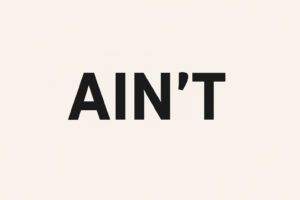Is “Ain’t” Correct English?-Grammar Puzzle Solved (5)
The word “ain’t” often sparks debate among grammar lovers and language learners. Traditionally, it is incorrect or nonstandard. However, its history and usage tell a more complex story. So, is “ain’t” really incorrect English, or has it found a place in the evolving language? Let’s explore this and look at other slang terms that have entered standard English over time.
Originally, “ain’t” emerged as a contraction of “am not” in the early 18th century. Educated speakers commonly use it. Over time, its usage extended to mean “is not,” “are not,” “has not,” and “have not.” Because of this wide application, grammarians began to view it as careless or improper, especially in formal contexts.
Today, “ain’t” is still nonstandard in formal writing. However, in spoken English, music, literature, and casual dialogue, it’s widely understood and often used for emphasis, style, or cultural expression. In short: “ain’t” is not considered correct in formal English, but it’s accepted in informal contexts.
Interestingly, many words that began as slang have made their way into standard English. Here are a few examples:
-
Cool – Once slang for something impressive or fashionable, it’s now acceptable.
-
Okay (OK) – Initially a humorous abbreviation in the 19th century, it’s now universal.
-
Hang out – Originally informal, now commonly used to mean spending time socially.
-
Bail – Once street slang for leaving abruptly, now found in mainstream conversation.
-
Chill – Used to mean “relax” or “calm down,” now widely recognized.
Language evolves with culture. What begins as slang often gains acceptance over time, especially when used across generations and media. Dictionaries frequently update entries to reflect these changes, blurring the line between formal and informal speech.
In conclusion, while “ain’t” is still nonstandard, it is not wrong in every context. As language continues to adapt, many words once seen as improper gradually become standard. So the next time someone says “ain’t,” remember—it’s part of the living, breathing history of English.

The History of English Literature: https://englishlitnotes.com/
Hitch-hiking Across the Sahara: https://englishwithnaeemullahbutt.com/2025/06/02/the-sahara/
Mark Twain: https://americanlit.englishlitnotes.com/mark-twain/
Expressions of Time, Money, and Distance in Grammar: https://grammarpuzzlesolved.englishlitnotes.com/expressions-of-time-money-distance/
Visit ChatGPT to explore the platform and interact with the AI:https://chat.openai.com
Discover more from Grammar Puzzle Solved by Naeem Ullah Butt
Subscribe to get the latest posts sent to your email.